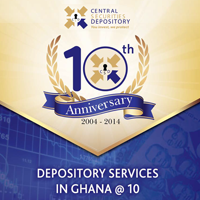 Jobs or stability: that is the trade-off the Bank of Ghana (BoG) faces as it decides today if it is necessary to raise borrowing costs further to stabilise the volatile cedi and stem rising inflation.
Jobs or stability: that is the trade-off the Bank of Ghana (BoG) faces as it decides today if it is necessary to raise borrowing costs further to stabilise the volatile cedi and stem rising inflation.
The currency has slipped by 19% against the dollar this year and shrugged off measures targetted to stem its slide, including higher yields on cedi assets to mop up excess liquidity in the economy and curb the flight to dollars.
With the currency still wobbly despite additional interventions in the banking system last month to boost foreign exchange supply and squeeze banks’ holdings of liquid cedi assets, the BoG is seen as likely to hike the policy rate a third time to reinforce the effect of past actions and contain inflation, which rose to a one-year peak of 9.1% in April.
“We expect the policy rate to be raised by at least 100 basis points to 15.5% despite the stabilisation of the cedi in recent weeks. This will ensure the continued stability of the local currency and ensure that the prevailing rates in the economy operate within the preferred bandwidth,” said Nii Ampa-Sowa, head of research at Databank Asset Management Services Ltd.
However, Dr. Joe Abbey, boss of the Centre for Policy Analysis (CEPA), believes the Central Bank has run out of ammunition to halt the cedi’s decline.
“I’ll not advise an increase in the rate again. We’ve gone as far as monetary policy can go. What we have to realise is that the trade-off is between jobs and macro stability. We should worry about jobs, joblessness, and poverty.”
In 2010 and 2011, the Central Bank had championed the cause of lower lending rates as it encouraged banks to emulate its policy-easing stance. During those two years, the BoG lowered the policy rate by a cumulative 550 basis points from 18% to 12.5%. But part of this progress has been undone in 2012 as interest rates have been hiked to support the cedi.
“We’re not going to get the jobs unless SMEs can access credit,” said Dr. Abbey. Further interest rate hikes are likely to lead banks to cut back lending to the private sector as they invest their funds in government paper.
“We have locked in 26% interest for the next five years,” he said, referring to the yield on last week’s five-year fixed-rate bond issued by the BoG on behalf of the government.
“If they raise the rate again, then there is the potential for the next bond to sell at an even higher rate. What investors will do then is sell the bonds they are holding now, get out, and come back and buy the bond with the higher yield.”
But tighter policy could assure investors looking for signs that the BoG remains resolute in its defence of the cedi, according to Nii Ampa-Sowa, who said the rising cost of government borrowing is evidence of investor’s risk-aversion.
“While we believe that investor confidence will be boosted by a further tightening of policy, the higher yields on the medium-term bond auctions clearly show the market believes that the volatile pressures still remain,” he said.
The fiscal is the jinx
“This whole crisis is a fiscal policy crisis. There is a market fear that we will, as usual, overspend in the election year and that the cedi will lose value,” Dr. Abbey contended.
The government is targetting a budget deficit of 4.8% of GDP in 2012, but most market analysts think the actual deficit will be bigger because of pressures to spend ahead of the December polls.
In March, analysts at Renaissance Capital forecast that the deficit will widen to 5.1% of GDP, and said the current account gap will increase by 0.2 percentage points to 8.7% of GDP.
But in May, the President, John Atta Mills, attempted to reverse the tide of negative expectations when he vowed to end the cycle of fiscal indiscipline associated with election years, warning government ministries, departments and agencies (MDAs) against overshooting their budgets for the year.
In a circular to the MDAs, the President directed that all procurement contracts be referred to the Attorney General’s office for review and clearance before ratification. He warned against the commencement of new projects before on-going projects have been completed, threatening heavy sanctions against violators.
According to Dr. Abbey, however, the President’s gesture does not suffice -- noting that recent revelations about the cost of fuel subsidies and the inflation of the public-sector payroll by illegal “ghost” names communicate the exact opposite picture to investors.
“We don’t want to rein-in the fiscal, so investors are saying that we are rather committed to overspending.”
Last month, a visiting International Monetary Fund (IMF) mission warned the government against maintaining fuel subsidies that cost GH¢60million a month to provide.
It also asked the government to fast-track an audit of the public-sector payroll and end payments to “ineligible” recipients. The Fund said this would generate savings of GH¢100million monthly.


